Exclusive from Xinjiang: Police and family members tell how and why heroic officers fought terrorists until sacrifice
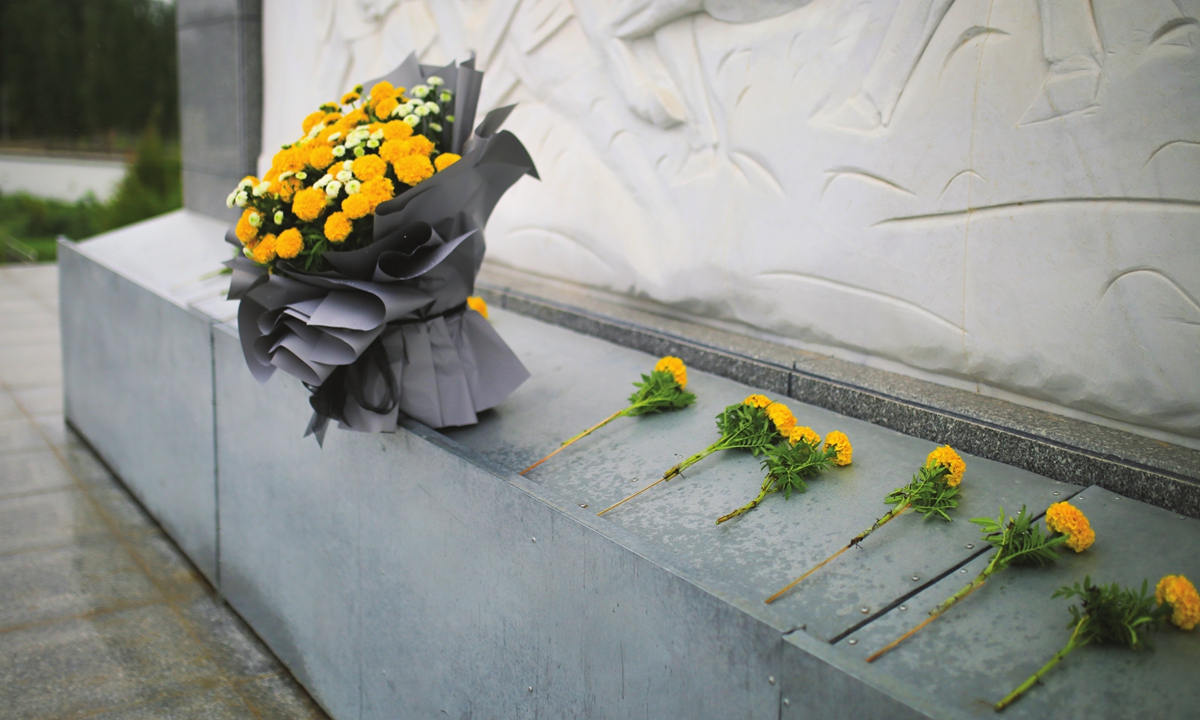
Photo: Fan Lingzhi/GT
"Tomorrow, I will buy fruits and nuts for the festival!" Tursungul Slamu still remembers every word her husband Abudueni Turdi said before going out into the night on July 27, 2014. A few hours after leaving home, Abudueni, who was the secretary of committee for discipline inspection of Dunbake township in Shache county, was taken as a hostage by terrorists in a confrontation with the police before being brutally killed. Nurmemet Wubul, one of the police officers fighting against the brazen terrorists, was furious to see their brutality and he too was severely injured in the fight.What happened in Shache county of Kashi Prefecture on July 28, 2014 was one of the most tragic moments when dealing with a terror attack and was one of the several thousand terror attacks in Northwest China's Xinjiang region from 1990 to 2016 with a large number of innocent residents being killed and several hundred police officers losing their lives.
The Global Times reporters visited many places in the Xinjiang region in Hotan, Kashi and Ili prefectures in July. By revisiting the places where terror attacks occurred, talking to the relatives of victims and family members of sacrificed officers, and paying tribute to the heroes in martyrs' cemeteries, we reviewed these heroes' touching stories and the hardship endured during Xinjiang's fight against terrorism.
Scars of honor
Shache county, a place with a 3,000-year-long history, is located in southeast Kashi. It is hometown of Amanni Shahan, who collected the Twelve Muqam, a musical form known as the mother of Uygur music. But this land of music and delicacy was haunted by the three evil forces - terrorism, extremism, and separatism.
On the early morning of July 28, 2014, a group of terrorists wielding knives and axes raided the Ailixihu township government and a local police station. Some of them ran to neighboring Huangdi town and put up roadblocks along the road from Huangdi town to Ailixihu town. They set fire to trucks along the roads and killed drivers and passengers.
According to data from Xinjiang regional government, 37 people died in the terrorist attack on July 28, 2014, and 31 trucks and cars were vandalized with six of them burned. The police shot 59 terrorists dead and arrested 215.
Nurmemet, who headed the public security bureau of Shache county, joined the police operation countering the terrorists and was severely injured by a stray bullet. The scar - which is still clear to see this day - runs from his back to his left rib.
Nurmemet told the Global Times that the police received a tip-off from local residents that a group of unidentified people had suspiciously assembled. Police officers then detained a dozen of them. "Some of the members thought their plot had been exposed and decided to attack the police station. They stopped a truck, killed the driver, and drove it to raid the police station with explosives."
Nurmemet guided the Global Times reporters to the police station and pointed to the bullet holes that had been left on the front walls. "The scene was too horrible to look at - they drove the truck to break into the yard and it did not stop until crashing through the doors of the administrative building. There were terrorists who were holding weapons and rushing into the yard to confront the officers and were shot dead after receiving a warning," Nurmemet said.
After an investigation, the police found that these terrorists had planned to attack multiple locations in Shache county on July 29 - the Eid al-Fitr.
Nurmemet told the Global Times that he was commanded to execute the operation at 5 am in the morning and arrived at Alixihu town at around 8:50 am. The rioters were rampaging and some hid in nearby shelters to throw Molotov cocktails and stones at the village committee. After nailing down the group of rioters, Nurmemet went to a cross-road outside the 15th village, where more than 100 rioters confronted the police from a distance of 300 meters while brandishing knives and axes and police ammunition they had robbed from the village committee.
"We negotiated with them - explaining policies to them and persuading them to surrender by dropping their weapons. But they refused ," Nurmemet said.
"I found that Wulamujan Tohut, the head of Dunbake township, and Abudueni Turdi were hemmed in by rioters," he said, noting that the two officials' heads were bowed with rioters pointing knives at them. After a while they were felled.
"We later found that they were in hemorrhagic shock leading to their death. Each of them had dozens of stab wounds across their bodies," Nurmemet said.
The two officials refused to utter jihad slogans demanded by the terrorists, denounced them, and were eventually killed, local media reported.
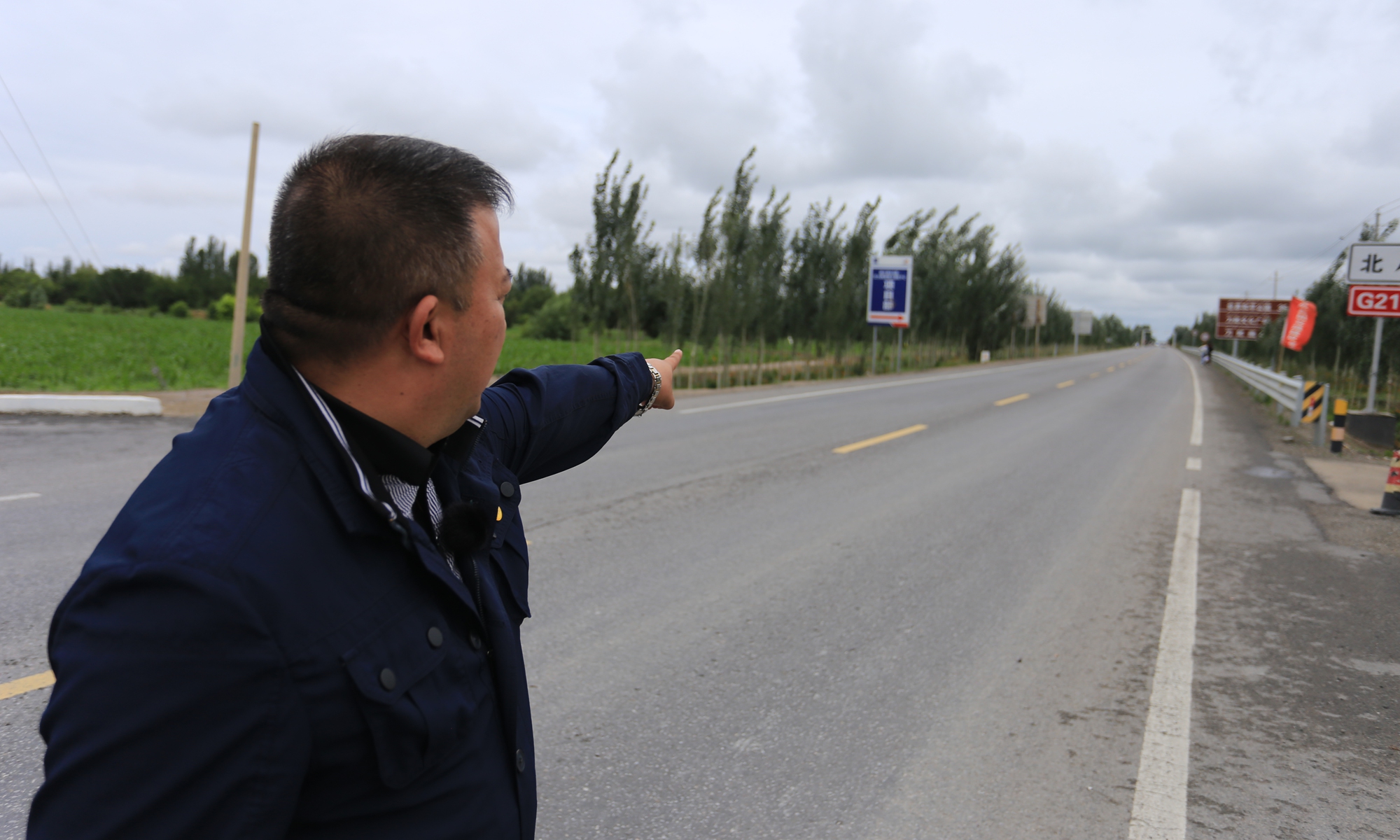
Nurmemet points to the site where the police had a confrontation with terrorists in a 2014 terror attack.
"When we saw our people struck down, we were outraged. We had tried to persuade the rioters but they refused to listen and killed our officials. We began to take action. Some rioters wanted to carry out suicide attacks by driving a tractor with one of the drivers' legs lashed to the accelerator and explosives in the vehicle," Nurmemet said.
During the operation, Nurmemet was severely injured. "I felt like I was being punched by someone heavily in the back, but when I turned back, there was nothing. Later I found something under my arm. I touched it and found my hands were full of blood," Nurmemet said.
He had sustained a gunshot wound which caused him to collapse due to excessive bleeding. "I thought about many things when being placed in the ambulance. I thought I might die. I also thought about my family and my comrades who were also injured," he said.
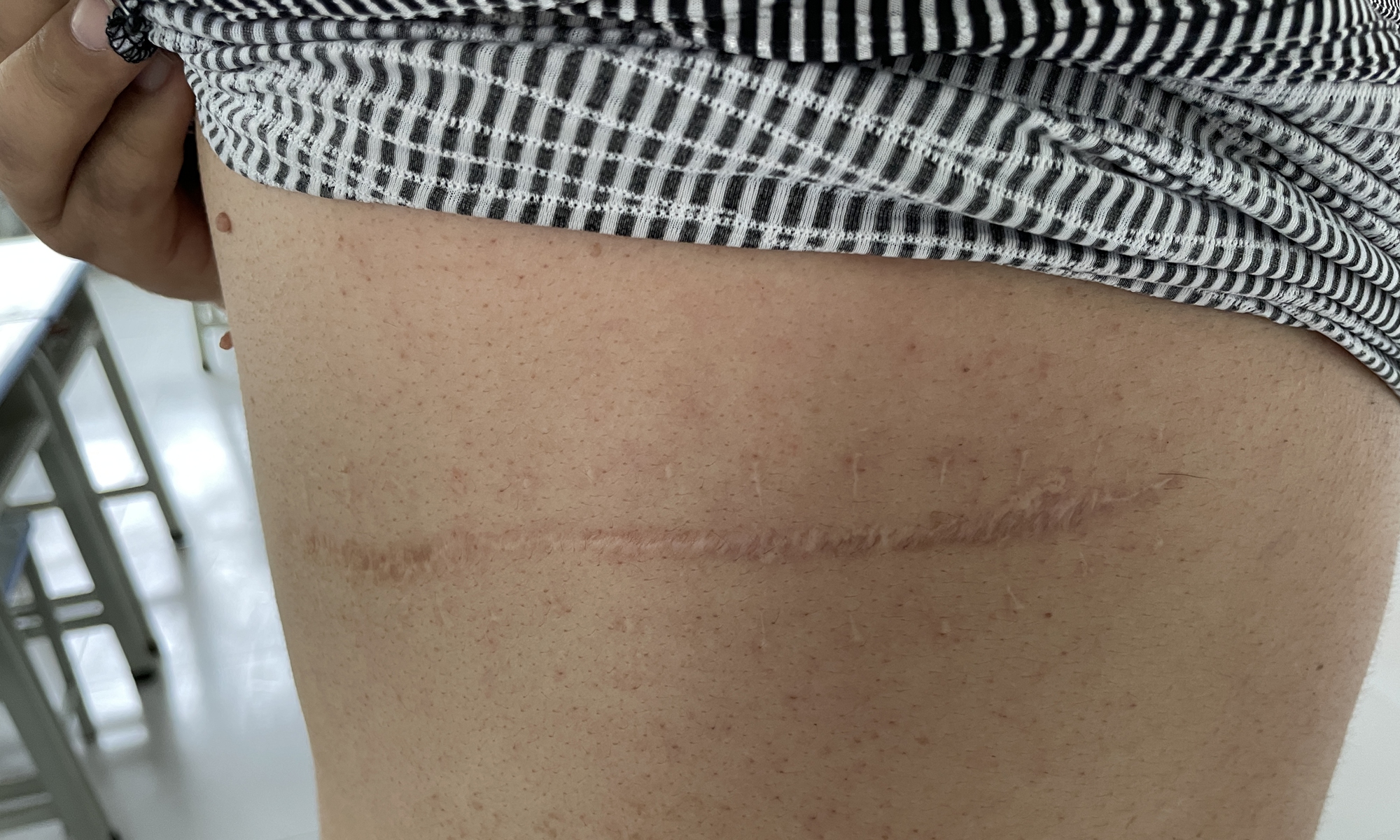
The scar left on Nurmemet back and ribs.
'Hate their guts'
Staring at a fancy tea set on the table, Tursungul Slamu said with tears in her eyes that it was bought by her husband when they had visited Kashi. After her husband died, she moved from their old house with the two daughters since "there are so many memories in the house of me and my husband being together and I could not bear the sorrow. Except for the tea set, I brought nothing with us when moving out," she said.
Tursungul is the wife of Abudueni, one of the two officials who were killed by terrorists in the terror attacks that happened on July 28, 2014.
It took three years for the widow to overcome the sorrow of losing her husband but when talking about her husband, tears fell.
"On the evening of July 27, before he went out for work, he noticed that we had not bought fruits and nuts for the upcoming festival. He told me 'Don't worry, I will bring them to you tomorrow morning!'" Tursungul said.
It had never occurred to either of them that these would be the final words with which he would leave her.
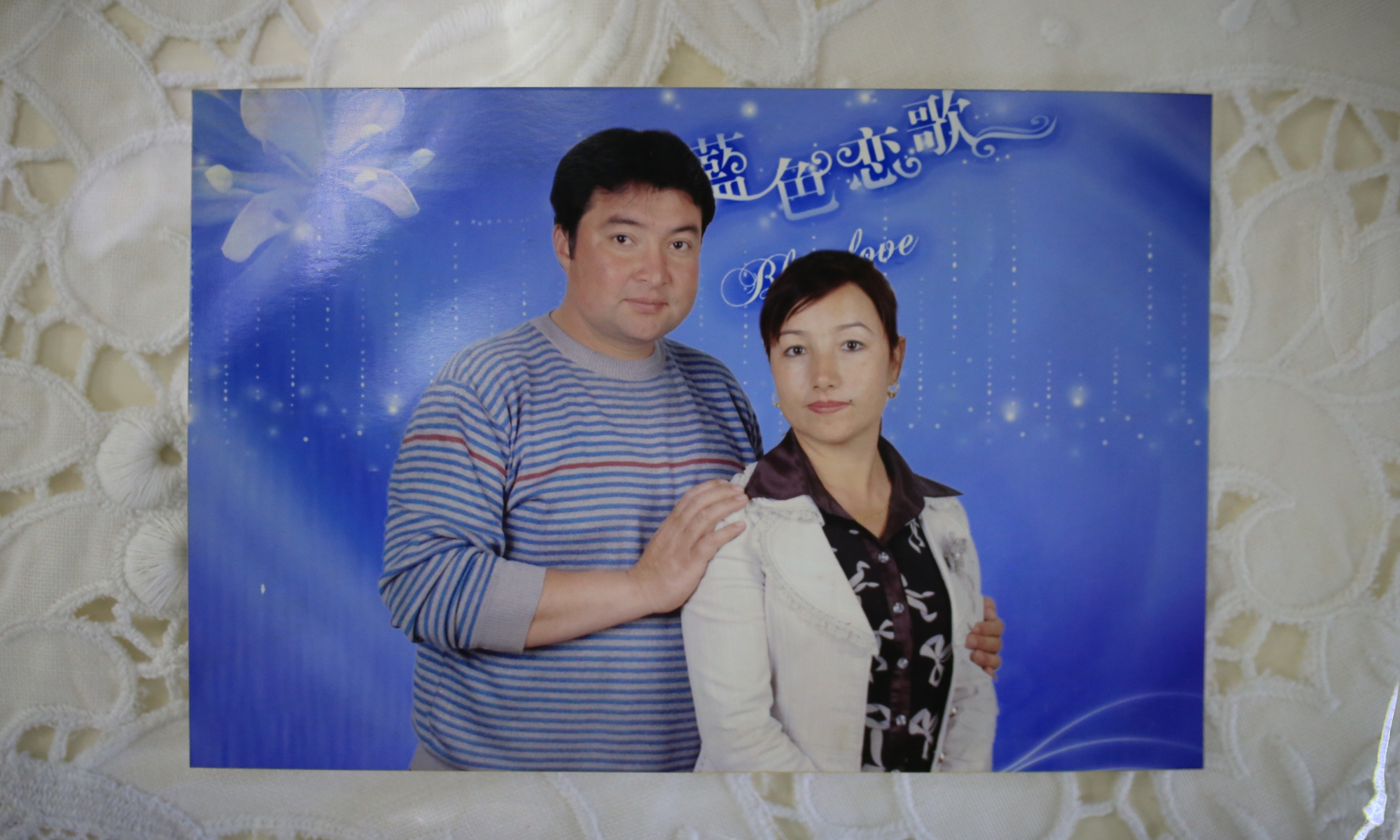
Abudueni and his wife Tursungul
"A county official called me the next morning to inform me that my husband had not come to work. I started calling him and raced to the county by riding a motorcycle," she told the Global Times.
"When I arrived at the county, one of my husband's colleagues told me that 'Your husband has sacrificed,'" Tursungul said. "They said the bodies of victims were being held in a nearby school and told me to help identify him. I did not want to believe that. On my way to the school, I said to myself that my husband was not there - he was in the hospital and injured. But when I arrived, I took a glance at his body, which had been placed in a single room, and I passed out without clearly seeing his face."
When Abuduani died, one of his daughters was 4 years old and the other 11. They were cared for by their grandparents for a long time as Tursungul was in deep sorrow.
"I missed him so much when festivals came. This year, when our oldest daughter went for the national college entrance examination, I also missed him," Tursungul said, noting that the government and the Party committee did not forgotten them and people visit the family on festivals.
"Previously, my daughters were curious about why so many people come to visit us and take care of us. I told them it's because their father is a martyr and they should be proud of him," she said.
Tursungul said she knew that terrorists involved in the attacks had been punished but "I still hate them."
"The Party and the government are good and our lives are rich and happy. Why did they engage in terrorist activities? I cannot figure it out. I hate them to their guts," Tursungul said, noting that her husband died while persuading the rioters and some people may have thought he was a fool. "But I did not think so. He was a Party member and carried with him his responsibility. If I were him, I would have done the same."
Cherish stability like cherishing the eyes
Xinjiang has never been short of hero stories of, like Abuduani and Nurmemet, who safeguarded the homeland and resisted the invasion of foreigners or fought against terrorism.
"Those who died to safeguard the people of all ethnic groups in Xinjiang will live long in our hearts," this sentence was engraved onto the tombstone of two martyrs - Long Fei and Kong Yongqiang - who were buried beside each other at a cemetery in Yining.
Long was a policeman in the public security bureau in the Ili Kazak Autonomous Prefecture. On April 19, 1998, Long was commanded to raid a house where a group of terrorists who smuggled weapons lived. He climbed into the yard and drew near the house. The moment he broke into the house, he was shot by the terrorists in the neck and died.
Two months later, on June 26, 1998, the bureau undertook another operation against the group of terrorists who planned to conduct explosions on June 30, 1998, during which Long's comrades-in-arms Kong Yongqiang and Nurtai Aniwar were sacrificed. They were buried near Long.
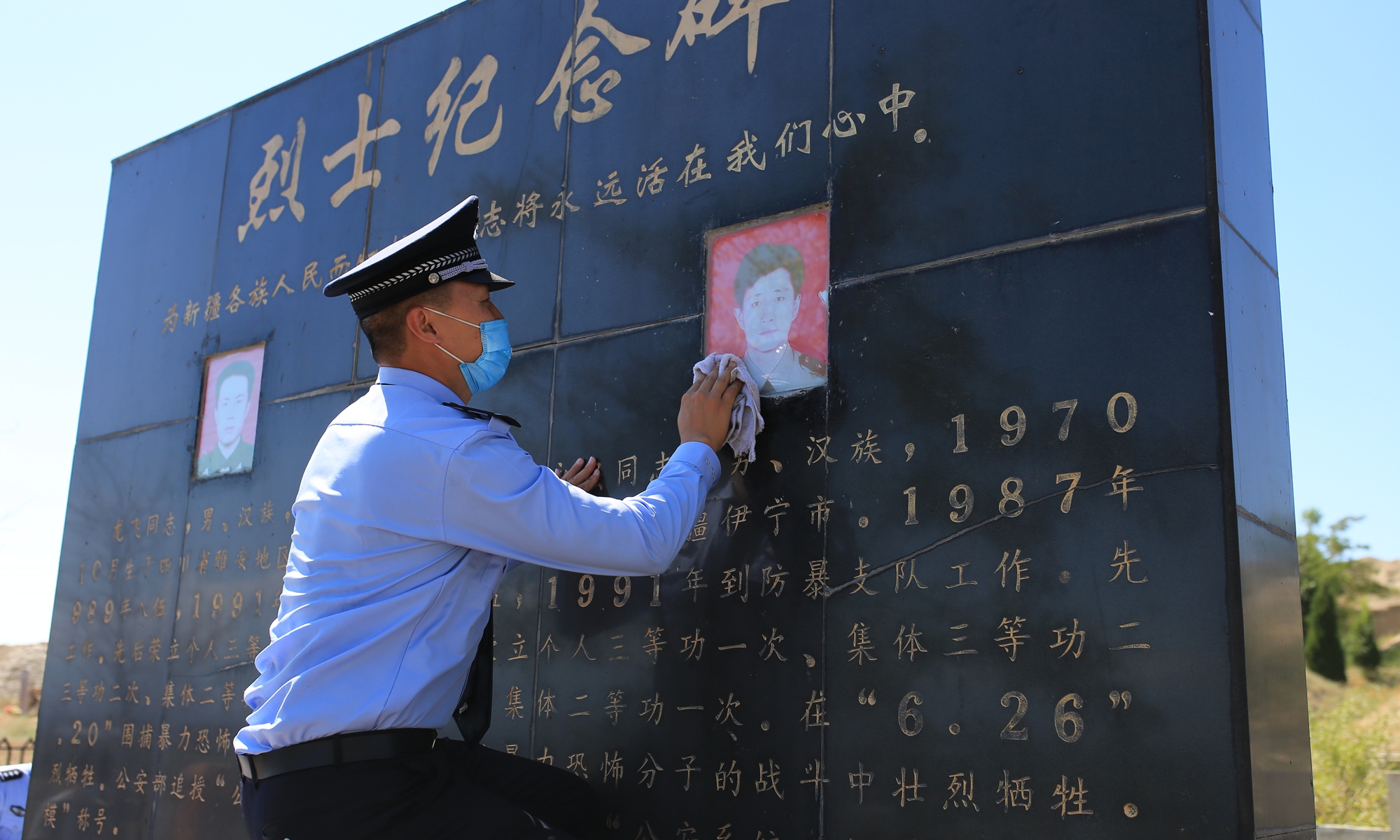
A police officer wipes the memorial stone for Long Fei and Kong Yongqiang.
Coming to the cemetery to pay tribute has become a regular activity for police officers in the public security bureau. Cutting weeds, wiping the tombstones, and lining up… police officers would hold a memorial ceremony in front of the tombs of these martyrs.
Wang Xinli, director of the logistic department of the public security bureau, who was Long and Kong's friend, told the Global Times that "I come here at every Tomb-Sweeping Day to see them and talk to them."
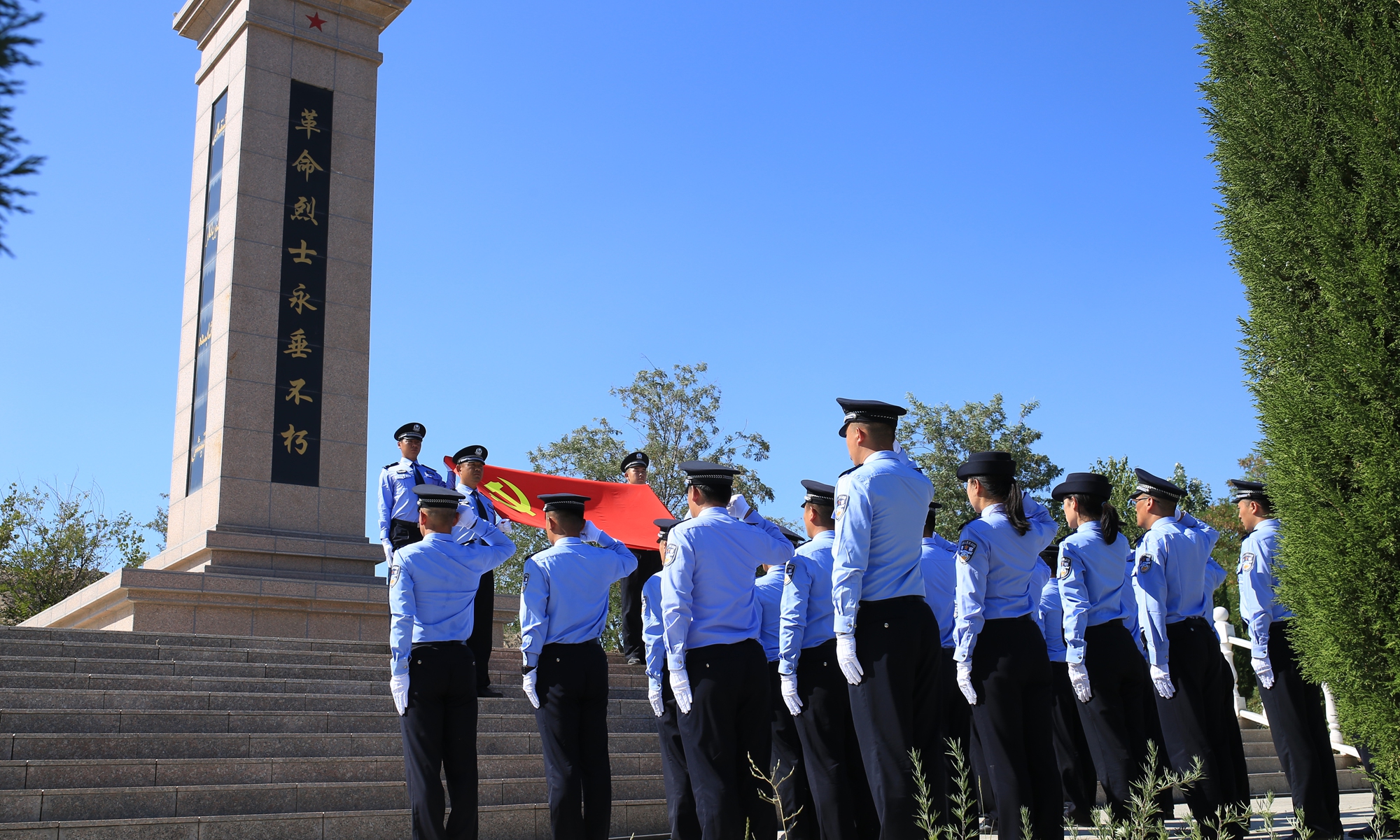
Police officers held memorial ceremony for heroes in a cemetery in Ili. Photos: Fan Lingzhi/GT
The senior police officer lit two cigarettes and put them in front of the tombs of Long and Kong. "We have come to see you again, old pals. Our special policemen took an oath here. Please rest assured - we will carry on with your mission and fight for the stability and peace of the region. Please rest assured my comrades-in-arms!"
In the martyr cemetery in the Hotan Prefecture, Mulat Shrifjan carefully wiped the rain drops from the photo of his friend Airet Mamut, former deputy head of the public security bureau in Pishan county in Hotan, who died five years ago in the fight against terrorism. "I wish he could see today's Xinjiang," Mulat said.
On September 10, 2016, Airet led a group of police officers to arrest a nationally wanted terrorist group leader in Pishan county. When besieged in a burrow, the terrorist ignited an explosive device and tossed it at him. Airet died at the age of 47.
"When I was told of his death, I could not believe it and wished it was not true. I kept remembering him and felt heartbroken," Mulat said.
According to data from the Xinjiang authorities, since 2014, Xinjiang has cracked down on 1,599 terrorist groups, seized 12,995 terrorists, recovered 2,052 explosive devices, conducted investigations into 4,858 illegal religious activities, and seized 345,229 pieces of illegal propaganda materials. From 1990 to the end of 2016, several hundred police officers died in the line of duty.
All these police officers' names are remembered in Xinjiang. The Global Times saw heroes from the 1920s who had sacrificed their lives to safeguard Xinjiang's stability were also remembered. Some of the martyrs did not even leave a photo and some died at a young age.
Thanks to these people, residents of all ethnic groups in Xinjiang can now enjoy a peaceful and happy life.
"When I see the hustling and bustling streets full of people, people dancing happily in squares, students going to school, and residents enjoying delicious food at the night market, I remember my comrades-in-arms who died in the anti-terrorism fight," Mulat said.
"If I could have another drink with my old friend Airet, I would want to say to him that 'I miss you.' For him, I will cherish today's stability and prosperity like cherishing my eyes," he said.



